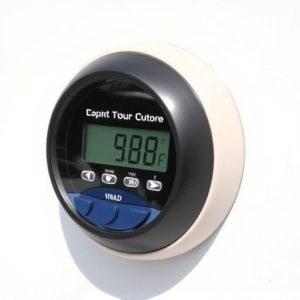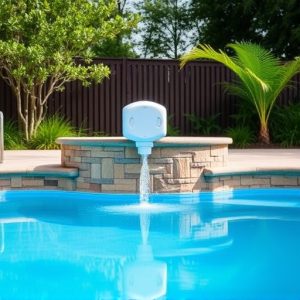Inground Pool Safety: Optimizing with Effective Alarm Systems
Swimming pool alarms are critical safety enhancements for inground pools, providing immediate audib…….
Swimming pool alarms are critical safety enhancements for inground pools, providing immediate audible warnings for unauthorized or unexpected activity around the pool. These systems help protect against accidents and unsupervised child access by detecting movements in the water or on the perimeter. It's essential to choose a system tailored to your pool's size, shape, and location for effective coverage. Modern inground pool alarms are intelligent, capable of distinguishing between routine activities and potentially unsafe scenarios, thereby bolstering safety measures. Homeowners should regularly inspect pool fencing, gates, and alarm systems to prevent unauthorized access and maintain a secure environment. Pool owners can select from various types of alarms, including surface wave detectors, magnetic float alarms, and motion-sensing alarms, each offering unique advantages. Regular maintenance, including monthly tests, battery replacements, and cleaning, is crucial for the alarms' accuracy and reliability in preventing pool-related incidents. Proactive risk assessment and vigilance are key components of maintaining a safe inground pool.
When safeguarding your inground pool, installing swimming pool alarms plays a pivotal role in ensuring the safety of loved ones and unauthorized individuals. This article delves into the necessity of these alarms as part of a comprehensive security strategy for your pool. We’ll explore how to evaluate your specific risk factors, select the most suitable alarm system, and implement and maintain it effectively to protect swimmers and prevent unsupervised access. Dive into understanding the critical importance of swimming pool alarms for inground pools and how they can serve as a vigilant guardian for your backyard oasis.
Inground Pool Security: The Role of Swimming Pool Alarms
Inground pool security is a multifaceted concern, encompassing physical barriers, access control systems, and safety devices like swimming pool alarms. These alarms play a pivotal role in enhancing the safety parameters around inground pools by providing an audible warning when unauthorized or unexpected activity is detected. The integration of swimming pool alarms for inground pools is a proactive measure that can serve as a deterrent to potential dangers, including accidental falls and unsupervised child access. These devices are designed to sense movements in the water or around the pool perimeter and alert homeowners or lifeguards instantly, offering precious response time during emergencies.
When selecting swimming pool alarms for inground pools, it is crucial to consider the specific needs of your pool environment. Factors such as the pool’s size, shape, and proximity to occupied areas can influence the type of alarm system best suited for your situation. Additionally, advancements in technology have led to the development of sophisticated alarms that can differentiate between normal activity and potentially hazardous situations. These intelligent systems contribute significantly to maintaining a secure atmosphere, ensuring that inground pools remain a source of enjoyment rather than risk. It is imperative for pool owners to prioritize the installation and maintenance of these alarms as part of their comprehensive pool safety strategy.
Assessing Your Inground Pool Risk and Choosing the Right Alarm System
When it comes to safeguarding your inground pool, a proactive approach to assessing potential risks is paramount. Homeowners with inground pools should conduct regular risk assessments to identify vulnerabilities that could lead to unauthorized access or accidents. This involves inspecting pool fencing for any breaches or weaknesses, ensuring that all gates self-close and latch securely, and verifying that pool alarms are functional and appropriately positioned. The environment surrounding the pool should also be evaluated for potential hazards such as overhanging branches or debris that could impede visibility or provide access to unauthorized individuals.
In response to these risk factors, selecting the right swimming pool alarms for inground pools is a critical decision. These alarms serve as a deterrent and an early warning system, notifying homeowners of any unpermitted entry into the water. There are various types of pool alarms available, including surface wave detectors, magnetic float alarms, and motion-sensing alarms. Each type has its own advantages and should be chosen based on the specific layout and usage patterns of your inground pool. For instance, a magnetic float alarm that activates when disturbed is effective for alerting to unauthorized use, while a motion-sensing alarm can detect movement around the pool perimeter. It’s important to research and select an alarm system that aligns with your pool’s design and the level of security you desire, ensuring peace of mind for you and your loved ones.
Installing and Maintaining Swimming Pool Alarms for Maximum Protection
When prioritizing safety around an inground pool, installing a reliable swimming pool alarm system is paramount. These alarms are designed to detect unauthorized access or potential dangers, such as excessively low or high water levels, providing immediate audible warnings that can be crucial in preventing accidents, particularly where small children or pets are present. The choice between perimeter and wave motion detectors depends on the specific layout and use of your inground pool; perimeter alarms offer protection around the entire pool area, while wave motion detectors monitor for unusual disturbances in the water that could indicate an individual entering unsupervised.
Maintaining swimming pool alarms for inground pools involves regular testing to ensure they function correctly. It’s important to perform monthly checks, replacing batteries as needed and verifying sensor sensitivity. Maintenance also includes keeping the alarm system clean and free from obstructions, ensuring it can accurately detect any unusual activity. Proactive maintenance not only guarantees the reliability of the alarm system but also contributes to a safer environment for pool users. Regularly testing your system with known disturbances, like throwing objects into the pool or simulating unauthorized entry, helps maintain a high level of vigilance and readiness. This proactive approach to maintenance ensures that the swimming pool alarms for inground pools are a dependable line of defense in safeguarding against potential incidents.


